Impact of Globalization on Marketing Functions: Nestle Case Study
VerifiedAdded on 2021/02/20
|22
|4360
|62
Report
AI Summary
This report investigates the multifaceted impact of globalization on the marketing function within businesses, using Nestle Plc as a focal point. The research explores the current trends of globalization in the context of international business and aims to determine its effects on marketing functions, identifying both positive and negative consequences. The study includes a project management plan, outlining costs, time scales, and resource allocation. The methodology employs a qualitative approach, utilizing non-probabilistic sampling with data collected from 25 marketing managers at Nestle through questionnaires. The data analysis reveals insights into the awareness of globalization trends, the perceived benefits within different departments, and the impacts on marketing strategies and performance. The report also addresses the challenges faced due to globalization, such as high marketing costs and the need for skilled employees, and offers recommendations for effective practices and strategies to cope with global trends. The findings highlight the importance of globalization for business growth and expansion and provide a comprehensive overview of the subject.

Managing a
successful
business
successful
business
Paraphrase This Document
Need a fresh take? Get an instant paraphrase of this document with our AI Paraphraser
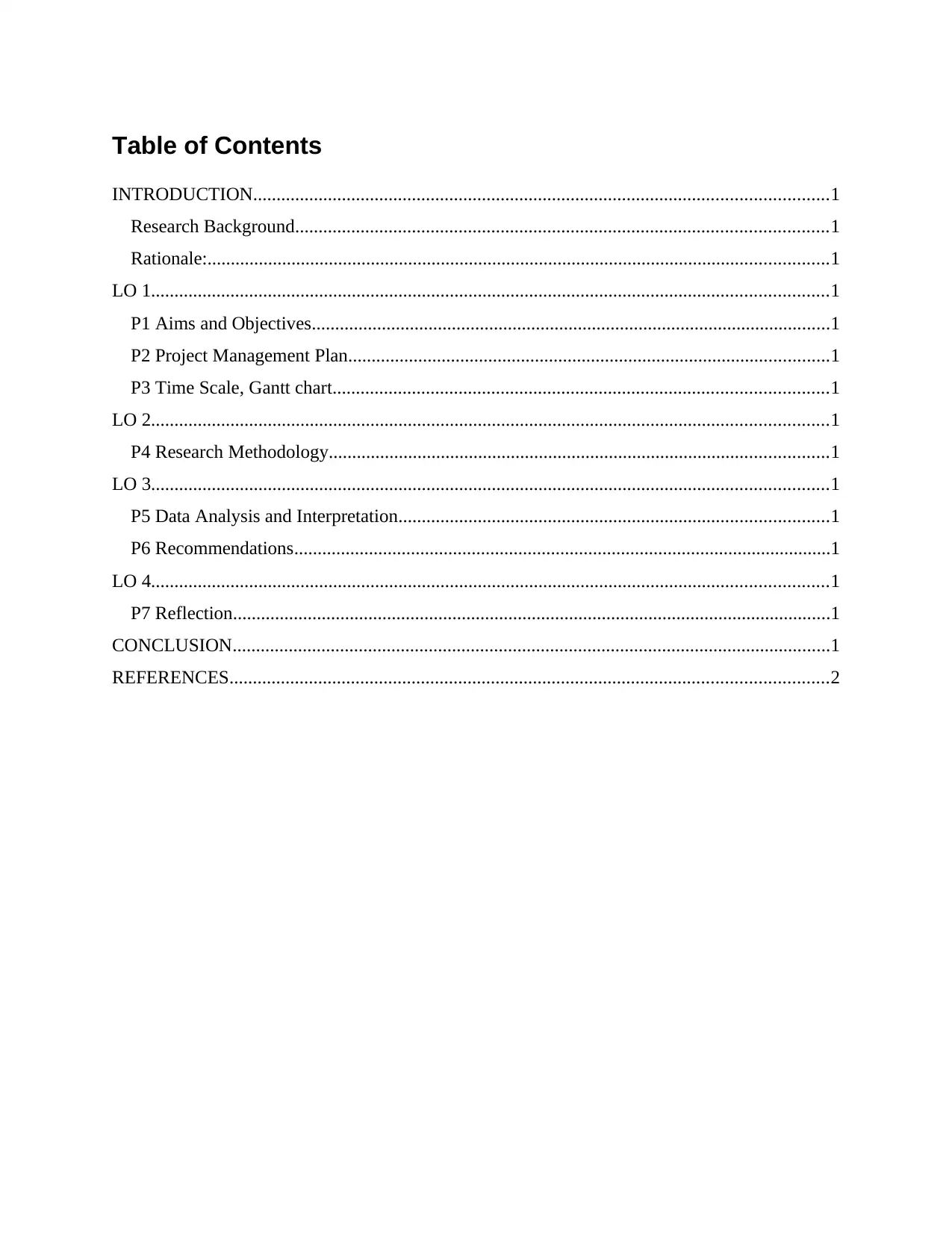
Table of Contents
INTRODUCTION...........................................................................................................................1
Research Background..................................................................................................................1
Rationale:.....................................................................................................................................1
LO 1.................................................................................................................................................1
P1 Aims and Objectives...............................................................................................................1
P2 Project Management Plan.......................................................................................................1
P3 Time Scale, Gantt chart..........................................................................................................1
LO 2.................................................................................................................................................1
P4 Research Methodology...........................................................................................................1
LO 3.................................................................................................................................................1
P5 Data Analysis and Interpretation............................................................................................1
P6 Recommendations...................................................................................................................1
LO 4.................................................................................................................................................1
P7 Reflection................................................................................................................................1
CONCLUSION................................................................................................................................1
REFERENCES................................................................................................................................2
INTRODUCTION...........................................................................................................................1
Research Background..................................................................................................................1
Rationale:.....................................................................................................................................1
LO 1.................................................................................................................................................1
P1 Aims and Objectives...............................................................................................................1
P2 Project Management Plan.......................................................................................................1
P3 Time Scale, Gantt chart..........................................................................................................1
LO 2.................................................................................................................................................1
P4 Research Methodology...........................................................................................................1
LO 3.................................................................................................................................................1
P5 Data Analysis and Interpretation............................................................................................1
P6 Recommendations...................................................................................................................1
LO 4.................................................................................................................................................1
P7 Reflection................................................................................................................................1
CONCLUSION................................................................................................................................1
REFERENCES................................................................................................................................2
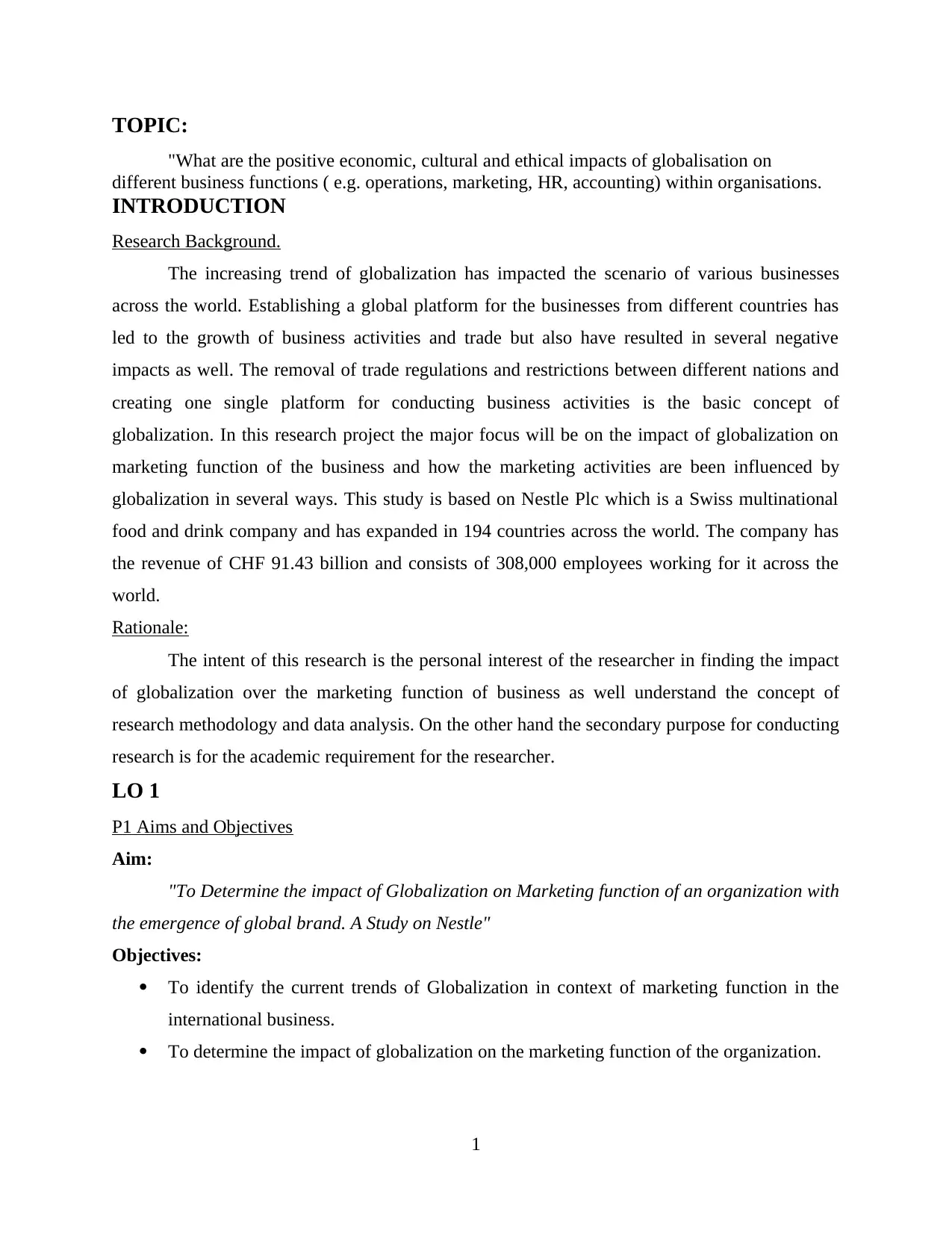
TOPIC:
"What are the positive economic, cultural and ethical impacts of globalisation on
different business functions ( e.g. operations, marketing, HR, accounting) within organisations.
INTRODUCTION
Research Background.
The increasing trend of globalization has impacted the scenario of various businesses
across the world. Establishing a global platform for the businesses from different countries has
led to the growth of business activities and trade but also have resulted in several negative
impacts as well. The removal of trade regulations and restrictions between different nations and
creating one single platform for conducting business activities is the basic concept of
globalization. In this research project the major focus will be on the impact of globalization on
marketing function of the business and how the marketing activities are been influenced by
globalization in several ways. This study is based on Nestle Plc which is a Swiss multinational
food and drink company and has expanded in 194 countries across the world. The company has
the revenue of CHF 91.43 billion and consists of 308,000 employees working for it across the
world.
Rationale:
The intent of this research is the personal interest of the researcher in finding the impact
of globalization over the marketing function of business as well understand the concept of
research methodology and data analysis. On the other hand the secondary purpose for conducting
research is for the academic requirement for the researcher.
LO 1
P1 Aims and Objectives
Aim:
"To Determine the impact of Globalization on Marketing function of an organization with
the emergence of global brand. A Study on Nestle"
Objectives:
To identify the current trends of Globalization in context of marketing function in the
international business.
To determine the impact of globalization on the marketing function of the organization.
1
"What are the positive economic, cultural and ethical impacts of globalisation on
different business functions ( e.g. operations, marketing, HR, accounting) within organisations.
INTRODUCTION
Research Background.
The increasing trend of globalization has impacted the scenario of various businesses
across the world. Establishing a global platform for the businesses from different countries has
led to the growth of business activities and trade but also have resulted in several negative
impacts as well. The removal of trade regulations and restrictions between different nations and
creating one single platform for conducting business activities is the basic concept of
globalization. In this research project the major focus will be on the impact of globalization on
marketing function of the business and how the marketing activities are been influenced by
globalization in several ways. This study is based on Nestle Plc which is a Swiss multinational
food and drink company and has expanded in 194 countries across the world. The company has
the revenue of CHF 91.43 billion and consists of 308,000 employees working for it across the
world.
Rationale:
The intent of this research is the personal interest of the researcher in finding the impact
of globalization over the marketing function of business as well understand the concept of
research methodology and data analysis. On the other hand the secondary purpose for conducting
research is for the academic requirement for the researcher.
LO 1
P1 Aims and Objectives
Aim:
"To Determine the impact of Globalization on Marketing function of an organization with
the emergence of global brand. A Study on Nestle"
Objectives:
To identify the current trends of Globalization in context of marketing function in the
international business.
To determine the impact of globalization on the marketing function of the organization.
1
⊘ This is a preview!⊘
Do you want full access?
Subscribe today to unlock all pages.

Trusted by 1+ million students worldwide
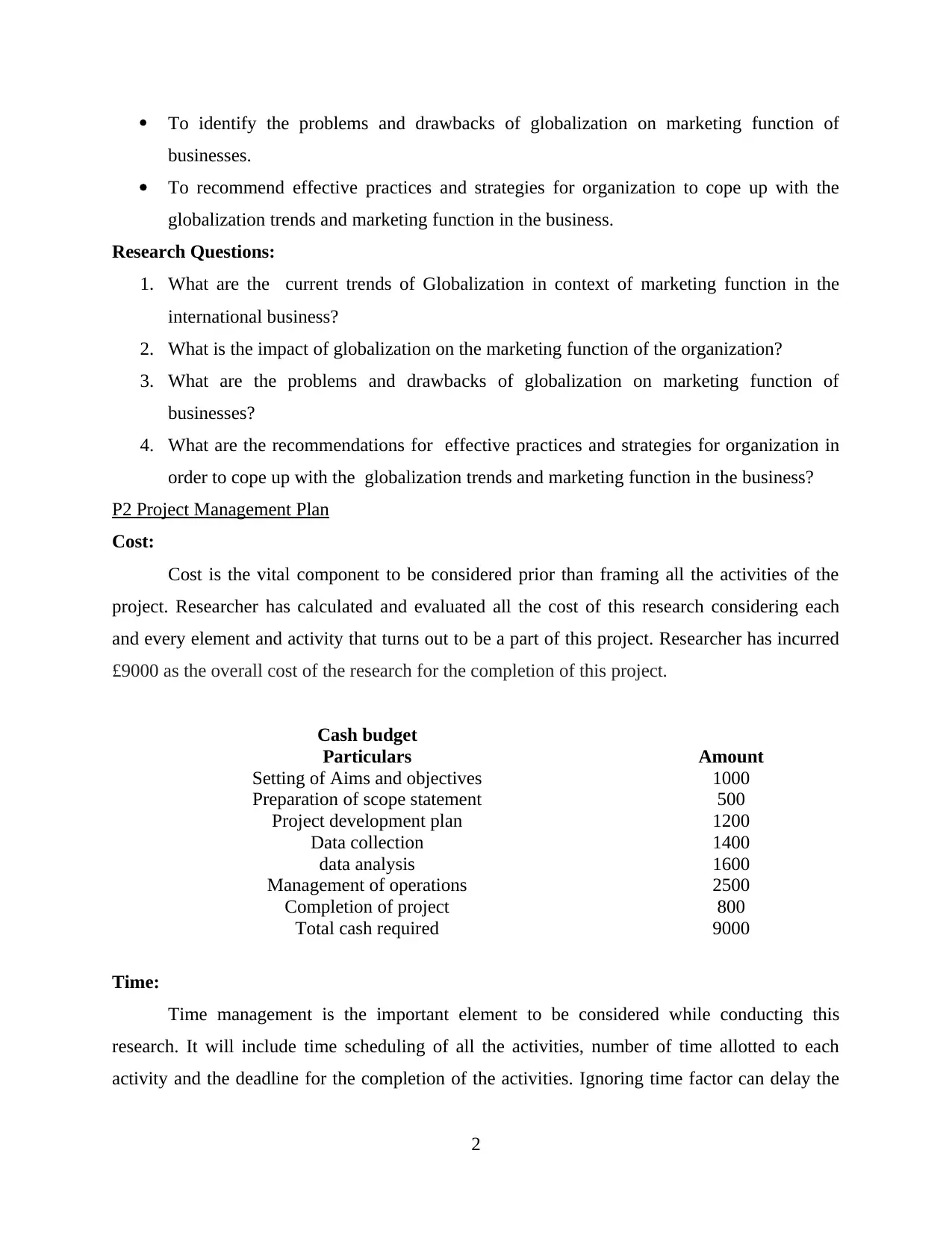
To identify the problems and drawbacks of globalization on marketing function of
businesses.
To recommend effective practices and strategies for organization to cope up with the
globalization trends and marketing function in the business.
Research Questions:
1. What are the current trends of Globalization in context of marketing function in the
international business?
2. What is the impact of globalization on the marketing function of the organization?
3. What are the problems and drawbacks of globalization on marketing function of
businesses?
4. What are the recommendations for effective practices and strategies for organization in
order to cope up with the globalization trends and marketing function in the business?
P2 Project Management Plan
Cost:
Cost is the vital component to be considered prior than framing all the activities of the
project. Researcher has calculated and evaluated all the cost of this research considering each
and every element and activity that turns out to be a part of this project. Researcher has incurred
£9000 as the overall cost of the research for the completion of this project.
Cash budget
Particulars Amount
Setting of Aims and objectives 1000
Preparation of scope statement 500
Project development plan 1200
Data collection 1400
data analysis 1600
Management of operations 2500
Completion of project 800
Total cash required 9000
Time:
Time management is the important element to be considered while conducting this
research. It will include time scheduling of all the activities, number of time allotted to each
activity and the deadline for the completion of the activities. Ignoring time factor can delay the
2
businesses.
To recommend effective practices and strategies for organization to cope up with the
globalization trends and marketing function in the business.
Research Questions:
1. What are the current trends of Globalization in context of marketing function in the
international business?
2. What is the impact of globalization on the marketing function of the organization?
3. What are the problems and drawbacks of globalization on marketing function of
businesses?
4. What are the recommendations for effective practices and strategies for organization in
order to cope up with the globalization trends and marketing function in the business?
P2 Project Management Plan
Cost:
Cost is the vital component to be considered prior than framing all the activities of the
project. Researcher has calculated and evaluated all the cost of this research considering each
and every element and activity that turns out to be a part of this project. Researcher has incurred
£9000 as the overall cost of the research for the completion of this project.
Cash budget
Particulars Amount
Setting of Aims and objectives 1000
Preparation of scope statement 500
Project development plan 1200
Data collection 1400
data analysis 1600
Management of operations 2500
Completion of project 800
Total cash required 9000
Time:
Time management is the important element to be considered while conducting this
research. It will include time scheduling of all the activities, number of time allotted to each
activity and the deadline for the completion of the activities. Ignoring time factor can delay the
2
Paraphrase This Document
Need a fresh take? Get an instant paraphrase of this document with our AI Paraphraser
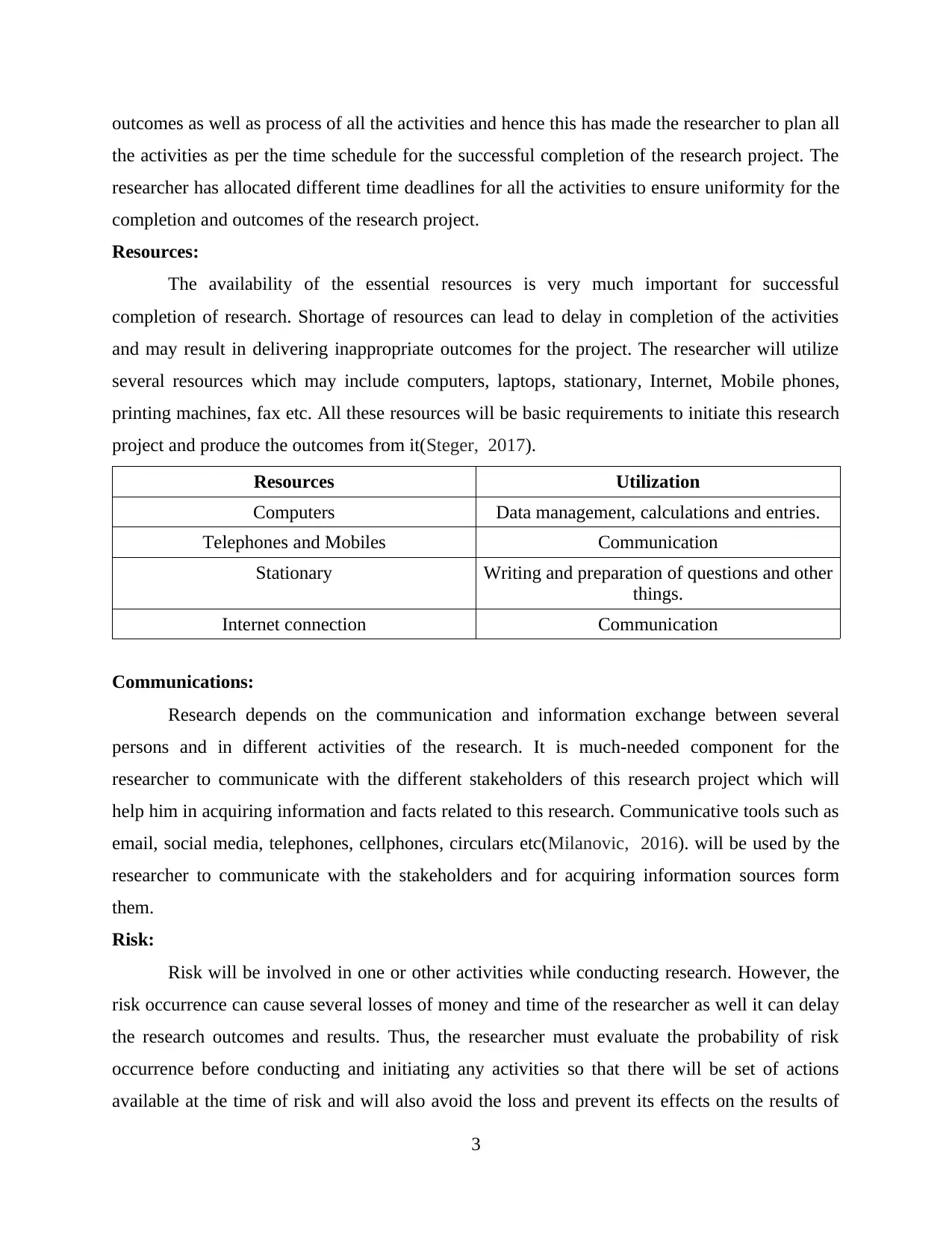
outcomes as well as process of all the activities and hence this has made the researcher to plan all
the activities as per the time schedule for the successful completion of the research project. The
researcher has allocated different time deadlines for all the activities to ensure uniformity for the
completion and outcomes of the research project.
Resources:
The availability of the essential resources is very much important for successful
completion of research. Shortage of resources can lead to delay in completion of the activities
and may result in delivering inappropriate outcomes for the project. The researcher will utilize
several resources which may include computers, laptops, stationary, Internet, Mobile phones,
printing machines, fax etc. All these resources will be basic requirements to initiate this research
project and produce the outcomes from it(Steger, 2017).
Resources Utilization
Computers Data management, calculations and entries.
Telephones and Mobiles Communication
Stationary Writing and preparation of questions and other
things.
Internet connection Communication
Communications:
Research depends on the communication and information exchange between several
persons and in different activities of the research. It is much-needed component for the
researcher to communicate with the different stakeholders of this research project which will
help him in acquiring information and facts related to this research. Communicative tools such as
email, social media, telephones, cellphones, circulars etc(Milanovic, 2016). will be used by the
researcher to communicate with the stakeholders and for acquiring information sources form
them.
Risk:
Risk will be involved in one or other activities while conducting research. However, the
risk occurrence can cause several losses of money and time of the researcher as well it can delay
the research outcomes and results. Thus, the researcher must evaluate the probability of risk
occurrence before conducting and initiating any activities so that there will be set of actions
available at the time of risk and will also avoid the loss and prevent its effects on the results of
3
the activities as per the time schedule for the successful completion of the research project. The
researcher has allocated different time deadlines for all the activities to ensure uniformity for the
completion and outcomes of the research project.
Resources:
The availability of the essential resources is very much important for successful
completion of research. Shortage of resources can lead to delay in completion of the activities
and may result in delivering inappropriate outcomes for the project. The researcher will utilize
several resources which may include computers, laptops, stationary, Internet, Mobile phones,
printing machines, fax etc. All these resources will be basic requirements to initiate this research
project and produce the outcomes from it(Steger, 2017).
Resources Utilization
Computers Data management, calculations and entries.
Telephones and Mobiles Communication
Stationary Writing and preparation of questions and other
things.
Internet connection Communication
Communications:
Research depends on the communication and information exchange between several
persons and in different activities of the research. It is much-needed component for the
researcher to communicate with the different stakeholders of this research project which will
help him in acquiring information and facts related to this research. Communicative tools such as
email, social media, telephones, cellphones, circulars etc(Milanovic, 2016). will be used by the
researcher to communicate with the stakeholders and for acquiring information sources form
them.
Risk:
Risk will be involved in one or other activities while conducting research. However, the
risk occurrence can cause several losses of money and time of the researcher as well it can delay
the research outcomes and results. Thus, the researcher must evaluate the probability of risk
occurrence before conducting and initiating any activities so that there will be set of actions
available at the time of risk and will also avoid the loss and prevent its effects on the results of
3
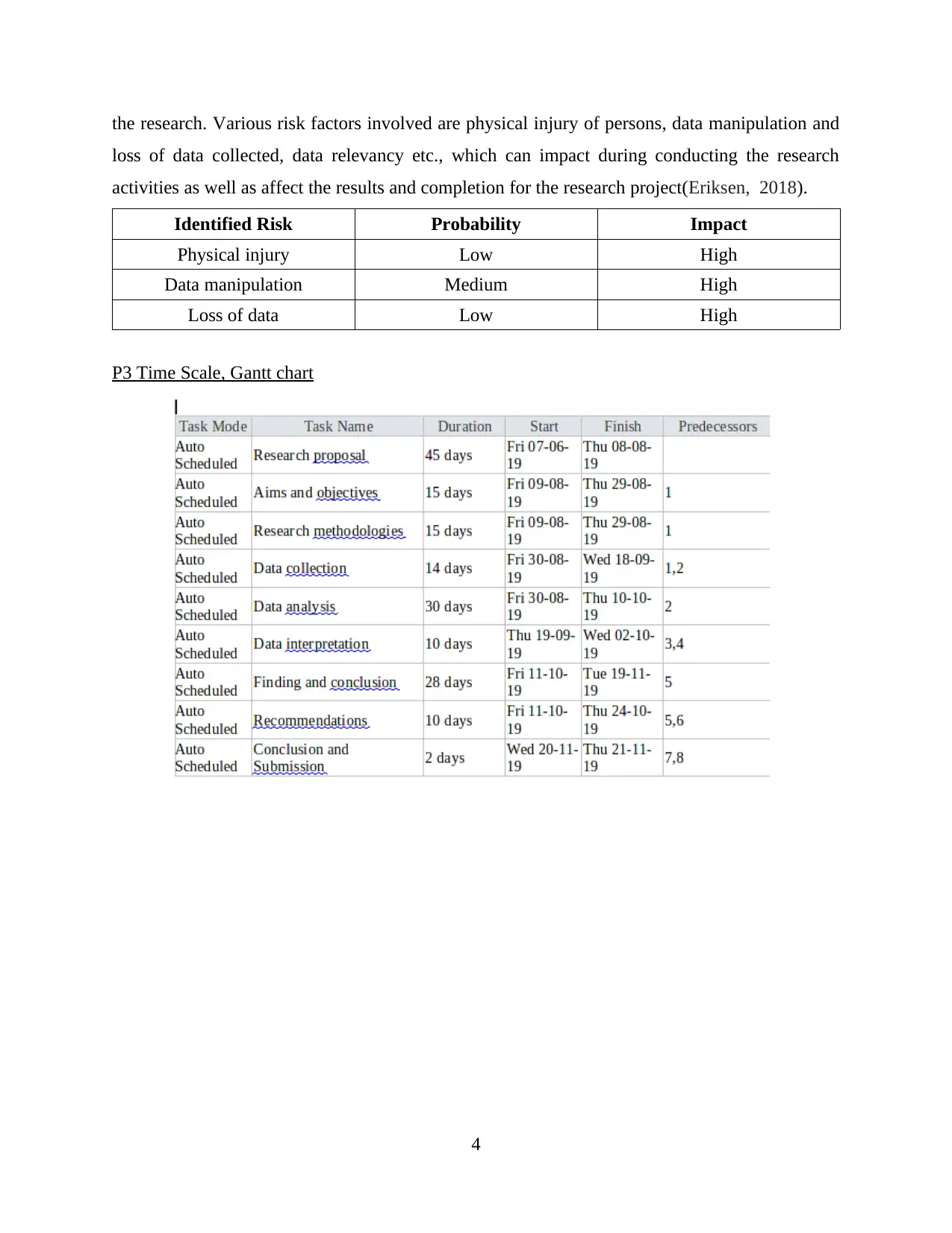
the research. Various risk factors involved are physical injury of persons, data manipulation and
loss of data collected, data relevancy etc., which can impact during conducting the research
activities as well as affect the results and completion for the research project(Eriksen, 2018).
Identified Risk Probability Impact
Physical injury Low High
Data manipulation Medium High
Loss of data Low High
P3 Time Scale, Gantt chart
4
loss of data collected, data relevancy etc., which can impact during conducting the research
activities as well as affect the results and completion for the research project(Eriksen, 2018).
Identified Risk Probability Impact
Physical injury Low High
Data manipulation Medium High
Loss of data Low High
P3 Time Scale, Gantt chart
4
⊘ This is a preview!⊘
Do you want full access?
Subscribe today to unlock all pages.

Trusted by 1+ million students worldwide
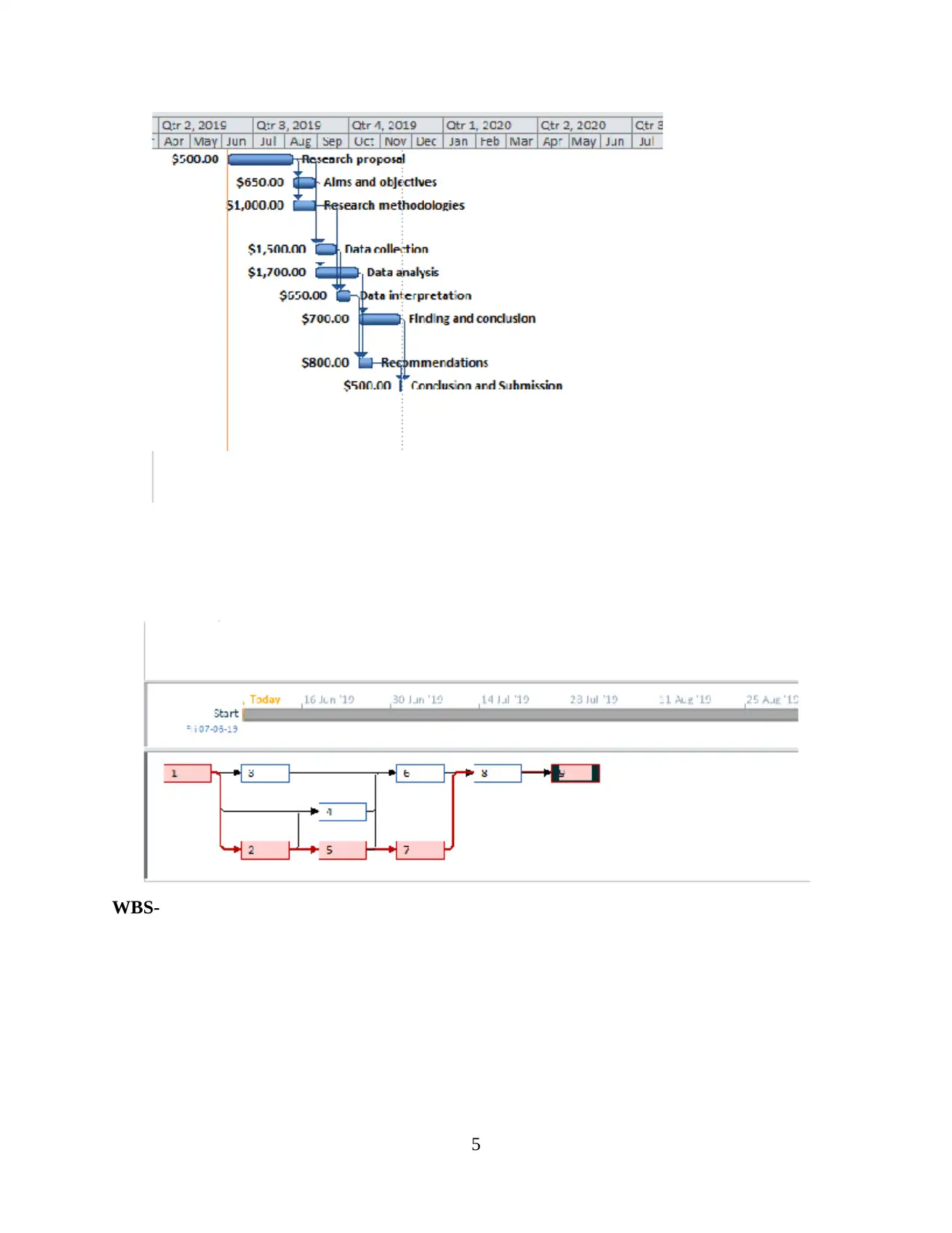
WBS-
5
5
Paraphrase This Document
Need a fresh take? Get an instant paraphrase of this document with our AI Paraphraser
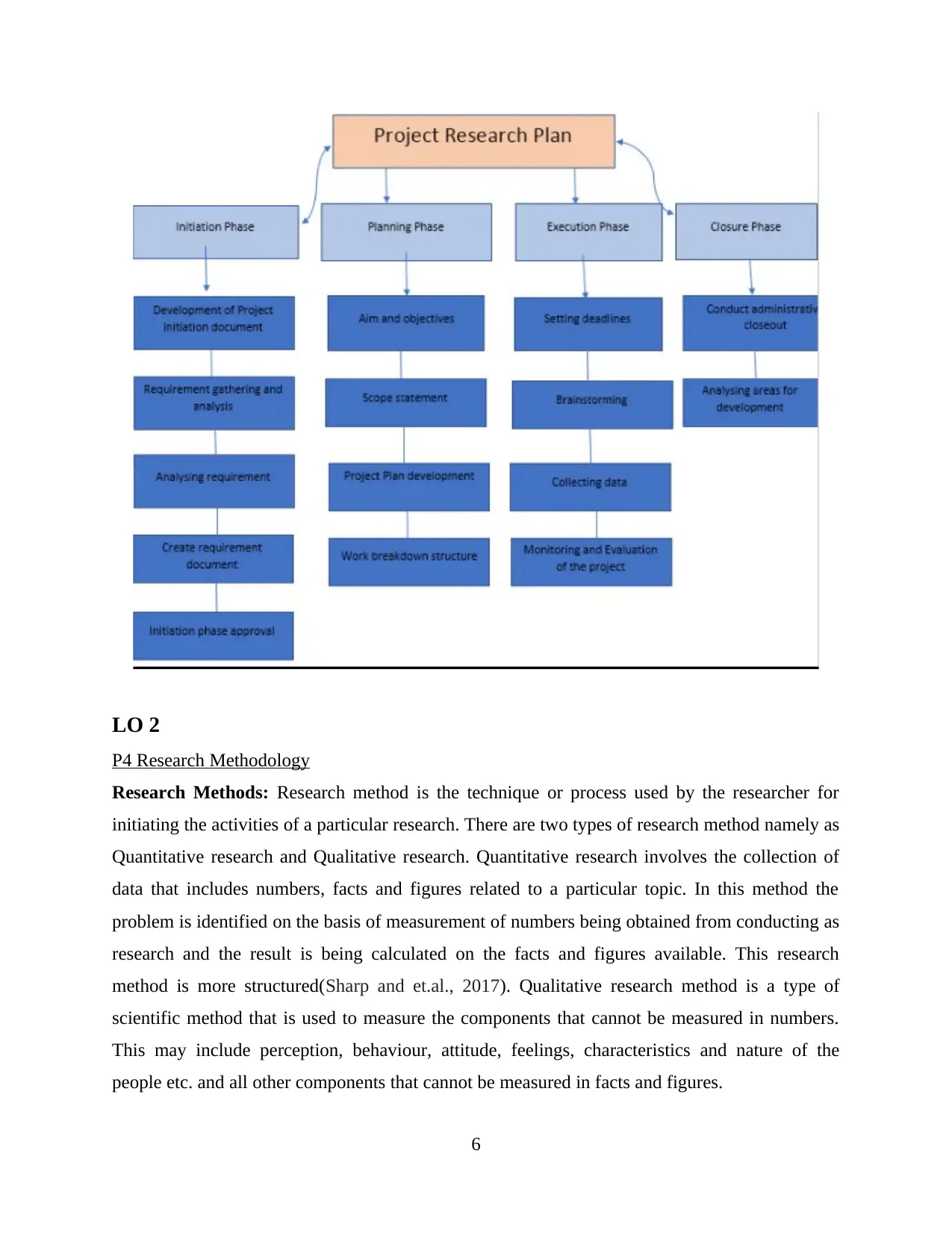
LO 2
P4 Research Methodology
Research Methods: Research method is the technique or process used by the researcher for
initiating the activities of a particular research. There are two types of research method namely as
Quantitative research and Qualitative research. Quantitative research involves the collection of
data that includes numbers, facts and figures related to a particular topic. In this method the
problem is identified on the basis of measurement of numbers being obtained from conducting as
research and the result is being calculated on the facts and figures available. This research
method is more structured(Sharp and et.al., 2017). Qualitative research method is a type of
scientific method that is used to measure the components that cannot be measured in numbers.
This may include perception, behaviour, attitude, feelings, characteristics and nature of the
people etc. and all other components that cannot be measured in facts and figures.
6
P4 Research Methodology
Research Methods: Research method is the technique or process used by the researcher for
initiating the activities of a particular research. There are two types of research method namely as
Quantitative research and Qualitative research. Quantitative research involves the collection of
data that includes numbers, facts and figures related to a particular topic. In this method the
problem is identified on the basis of measurement of numbers being obtained from conducting as
research and the result is being calculated on the facts and figures available. This research
method is more structured(Sharp and et.al., 2017). Qualitative research method is a type of
scientific method that is used to measure the components that cannot be measured in numbers.
This may include perception, behaviour, attitude, feelings, characteristics and nature of the
people etc. and all other components that cannot be measured in facts and figures.
6
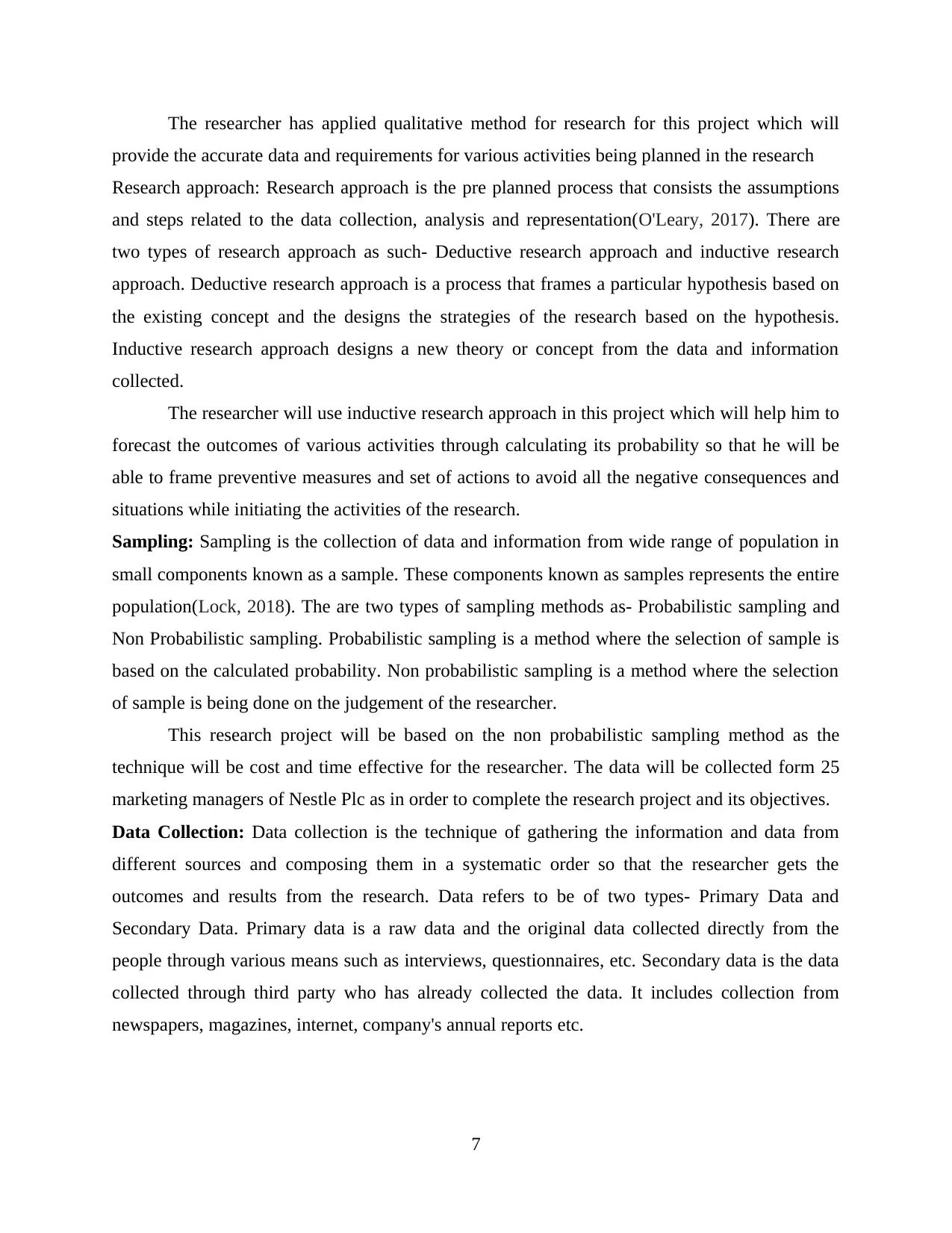
The researcher has applied qualitative method for research for this project which will
provide the accurate data and requirements for various activities being planned in the research
Research approach: Research approach is the pre planned process that consists the assumptions
and steps related to the data collection, analysis and representation(O'Leary, 2017). There are
two types of research approach as such- Deductive research approach and inductive research
approach. Deductive research approach is a process that frames a particular hypothesis based on
the existing concept and the designs the strategies of the research based on the hypothesis.
Inductive research approach designs a new theory or concept from the data and information
collected.
The researcher will use inductive research approach in this project which will help him to
forecast the outcomes of various activities through calculating its probability so that he will be
able to frame preventive measures and set of actions to avoid all the negative consequences and
situations while initiating the activities of the research.
Sampling: Sampling is the collection of data and information from wide range of population in
small components known as a sample. These components known as samples represents the entire
population(Lock, 2018). The are two types of sampling methods as- Probabilistic sampling and
Non Probabilistic sampling. Probabilistic sampling is a method where the selection of sample is
based on the calculated probability. Non probabilistic sampling is a method where the selection
of sample is being done on the judgement of the researcher.
This research project will be based on the non probabilistic sampling method as the
technique will be cost and time effective for the researcher. The data will be collected form 25
marketing managers of Nestle Plc as in order to complete the research project and its objectives.
Data Collection: Data collection is the technique of gathering the information and data from
different sources and composing them in a systematic order so that the researcher gets the
outcomes and results from the research. Data refers to be of two types- Primary Data and
Secondary Data. Primary data is a raw data and the original data collected directly from the
people through various means such as interviews, questionnaires, etc. Secondary data is the data
collected through third party who has already collected the data. It includes collection from
newspapers, magazines, internet, company's annual reports etc.
7
provide the accurate data and requirements for various activities being planned in the research
Research approach: Research approach is the pre planned process that consists the assumptions
and steps related to the data collection, analysis and representation(O'Leary, 2017). There are
two types of research approach as such- Deductive research approach and inductive research
approach. Deductive research approach is a process that frames a particular hypothesis based on
the existing concept and the designs the strategies of the research based on the hypothesis.
Inductive research approach designs a new theory or concept from the data and information
collected.
The researcher will use inductive research approach in this project which will help him to
forecast the outcomes of various activities through calculating its probability so that he will be
able to frame preventive measures and set of actions to avoid all the negative consequences and
situations while initiating the activities of the research.
Sampling: Sampling is the collection of data and information from wide range of population in
small components known as a sample. These components known as samples represents the entire
population(Lock, 2018). The are two types of sampling methods as- Probabilistic sampling and
Non Probabilistic sampling. Probabilistic sampling is a method where the selection of sample is
based on the calculated probability. Non probabilistic sampling is a method where the selection
of sample is being done on the judgement of the researcher.
This research project will be based on the non probabilistic sampling method as the
technique will be cost and time effective for the researcher. The data will be collected form 25
marketing managers of Nestle Plc as in order to complete the research project and its objectives.
Data Collection: Data collection is the technique of gathering the information and data from
different sources and composing them in a systematic order so that the researcher gets the
outcomes and results from the research. Data refers to be of two types- Primary Data and
Secondary Data. Primary data is a raw data and the original data collected directly from the
people through various means such as interviews, questionnaires, etc. Secondary data is the data
collected through third party who has already collected the data. It includes collection from
newspapers, magazines, internet, company's annual reports etc.
7
⊘ This is a preview!⊘
Do you want full access?
Subscribe today to unlock all pages.

Trusted by 1+ million students worldwide
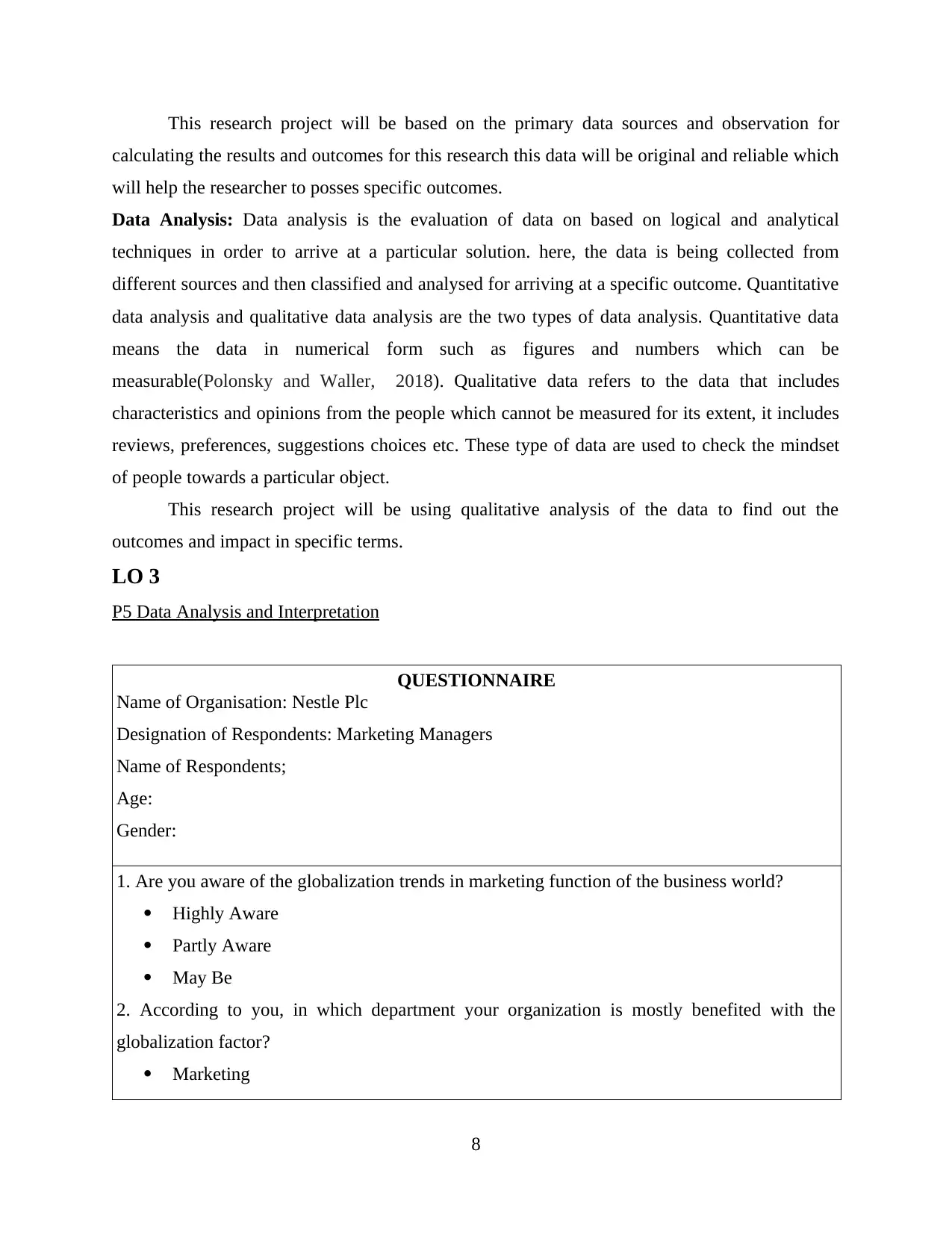
This research project will be based on the primary data sources and observation for
calculating the results and outcomes for this research this data will be original and reliable which
will help the researcher to posses specific outcomes.
Data Analysis: Data analysis is the evaluation of data on based on logical and analytical
techniques in order to arrive at a particular solution. here, the data is being collected from
different sources and then classified and analysed for arriving at a specific outcome. Quantitative
data analysis and qualitative data analysis are the two types of data analysis. Quantitative data
means the data in numerical form such as figures and numbers which can be
measurable(Polonsky and Waller, 2018). Qualitative data refers to the data that includes
characteristics and opinions from the people which cannot be measured for its extent, it includes
reviews, preferences, suggestions choices etc. These type of data are used to check the mindset
of people towards a particular object.
This research project will be using qualitative analysis of the data to find out the
outcomes and impact in specific terms.
LO 3
P5 Data Analysis and Interpretation
QUESTIONNAIRE
Name of Organisation: Nestle Plc
Designation of Respondents: Marketing Managers
Name of Respondents;
Age:
Gender:
1. Are you aware of the globalization trends in marketing function of the business world?
Highly Aware
Partly Aware
May Be
2. According to you, in which department your organization is mostly benefited with the
globalization factor?
Marketing
8
calculating the results and outcomes for this research this data will be original and reliable which
will help the researcher to posses specific outcomes.
Data Analysis: Data analysis is the evaluation of data on based on logical and analytical
techniques in order to arrive at a particular solution. here, the data is being collected from
different sources and then classified and analysed for arriving at a specific outcome. Quantitative
data analysis and qualitative data analysis are the two types of data analysis. Quantitative data
means the data in numerical form such as figures and numbers which can be
measurable(Polonsky and Waller, 2018). Qualitative data refers to the data that includes
characteristics and opinions from the people which cannot be measured for its extent, it includes
reviews, preferences, suggestions choices etc. These type of data are used to check the mindset
of people towards a particular object.
This research project will be using qualitative analysis of the data to find out the
outcomes and impact in specific terms.
LO 3
P5 Data Analysis and Interpretation
QUESTIONNAIRE
Name of Organisation: Nestle Plc
Designation of Respondents: Marketing Managers
Name of Respondents;
Age:
Gender:
1. Are you aware of the globalization trends in marketing function of the business world?
Highly Aware
Partly Aware
May Be
2. According to you, in which department your organization is mostly benefited with the
globalization factor?
Marketing
8
Paraphrase This Document
Need a fresh take? Get an instant paraphrase of this document with our AI Paraphraser
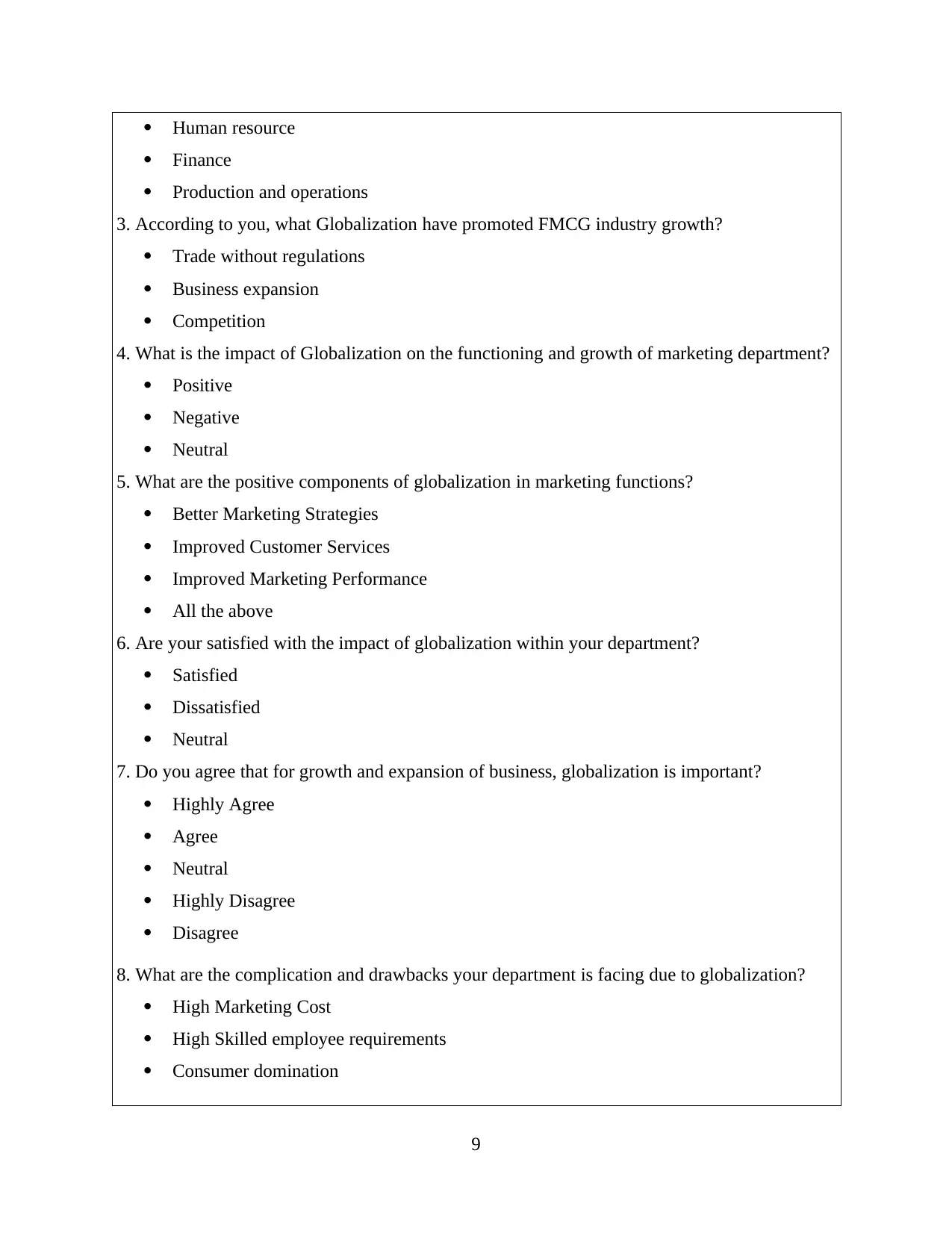
Human resource
Finance
Production and operations
3. According to you, what Globalization have promoted FMCG industry growth?
Trade without regulations
Business expansion
Competition
4. What is the impact of Globalization on the functioning and growth of marketing department?
Positive
Negative
Neutral
5. What are the positive components of globalization in marketing functions?
Better Marketing Strategies
Improved Customer Services
Improved Marketing Performance
All the above
6. Are your satisfied with the impact of globalization within your department?
Satisfied
Dissatisfied
Neutral
7. Do you agree that for growth and expansion of business, globalization is important?
Highly Agree
Agree
Neutral
Highly Disagree
Disagree
8. What are the complication and drawbacks your department is facing due to globalization?
High Marketing Cost
High Skilled employee requirements
Consumer domination
9
Finance
Production and operations
3. According to you, what Globalization have promoted FMCG industry growth?
Trade without regulations
Business expansion
Competition
4. What is the impact of Globalization on the functioning and growth of marketing department?
Positive
Negative
Neutral
5. What are the positive components of globalization in marketing functions?
Better Marketing Strategies
Improved Customer Services
Improved Marketing Performance
All the above
6. Are your satisfied with the impact of globalization within your department?
Satisfied
Dissatisfied
Neutral
7. Do you agree that for growth and expansion of business, globalization is important?
Highly Agree
Agree
Neutral
Highly Disagree
Disagree
8. What are the complication and drawbacks your department is facing due to globalization?
High Marketing Cost
High Skilled employee requirements
Consumer domination
9
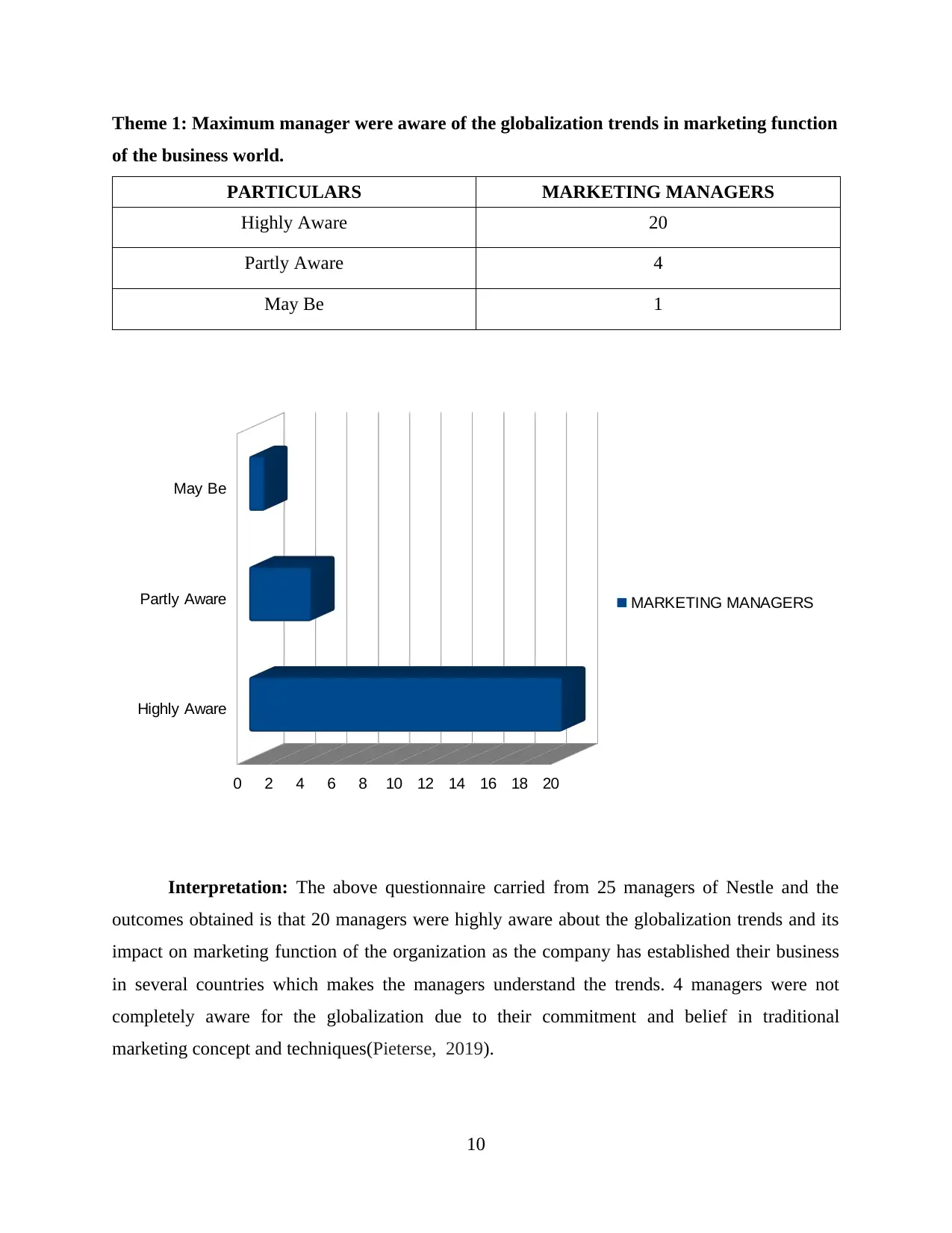
Theme 1: Maximum manager were aware of the globalization trends in marketing function
of the business world.
PARTICULARS MARKETING MANAGERS
Highly Aware 20
Partly Aware 4
May Be 1
Interpretation: The above questionnaire carried from 25 managers of Nestle and the
outcomes obtained is that 20 managers were highly aware about the globalization trends and its
impact on marketing function of the organization as the company has established their business
in several countries which makes the managers understand the trends. 4 managers were not
completely aware for the globalization due to their commitment and belief in traditional
marketing concept and techniques(Pieterse, 2019).
10
Highly Aware
Partly Aware
May Be
0 2 4 6 8 10 12 14 16 18 20
MARKETING MANAGERS
of the business world.
PARTICULARS MARKETING MANAGERS
Highly Aware 20
Partly Aware 4
May Be 1
Interpretation: The above questionnaire carried from 25 managers of Nestle and the
outcomes obtained is that 20 managers were highly aware about the globalization trends and its
impact on marketing function of the organization as the company has established their business
in several countries which makes the managers understand the trends. 4 managers were not
completely aware for the globalization due to their commitment and belief in traditional
marketing concept and techniques(Pieterse, 2019).
10
Highly Aware
Partly Aware
May Be
0 2 4 6 8 10 12 14 16 18 20
MARKETING MANAGERS
⊘ This is a preview!⊘
Do you want full access?
Subscribe today to unlock all pages.

Trusted by 1+ million students worldwide
1 out of 22
Related Documents
Your All-in-One AI-Powered Toolkit for Academic Success.
+13062052269
info@desklib.com
Available 24*7 on WhatsApp / Email
![[object Object]](/_next/static/media/star-bottom.7253800d.svg)
Unlock your academic potential
Copyright © 2020–2026 A2Z Services. All Rights Reserved. Developed and managed by ZUCOL.





